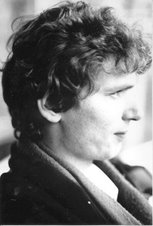
Mind your step at Penn station, NYC.
The new blog from Istanbul, initiated by Hans A.H.C. de Wit, with co-bloggers from surrounding countries.
 ...Argentina, where the wife of the current president, Nestor Kirchner, will succeed by his wife Cristina Fernandez de Kirchner, will maybe happen...
...Argentina, where the wife of the current president, Nestor Kirchner, will succeed by his wife Cristina Fernandez de Kirchner, will maybe happen... ...in 2008 when the former First Lady Hillary Clinton will become the first female president of the USA. For her fans, here here MySpace and blog...
...in 2008 when the former First Lady Hillary Clinton will become the first female president of the USA. For her fans, here here MySpace and blog... Most people know the name Erasmus of the European student network.
Most people know the name Erasmus of the European student network.
